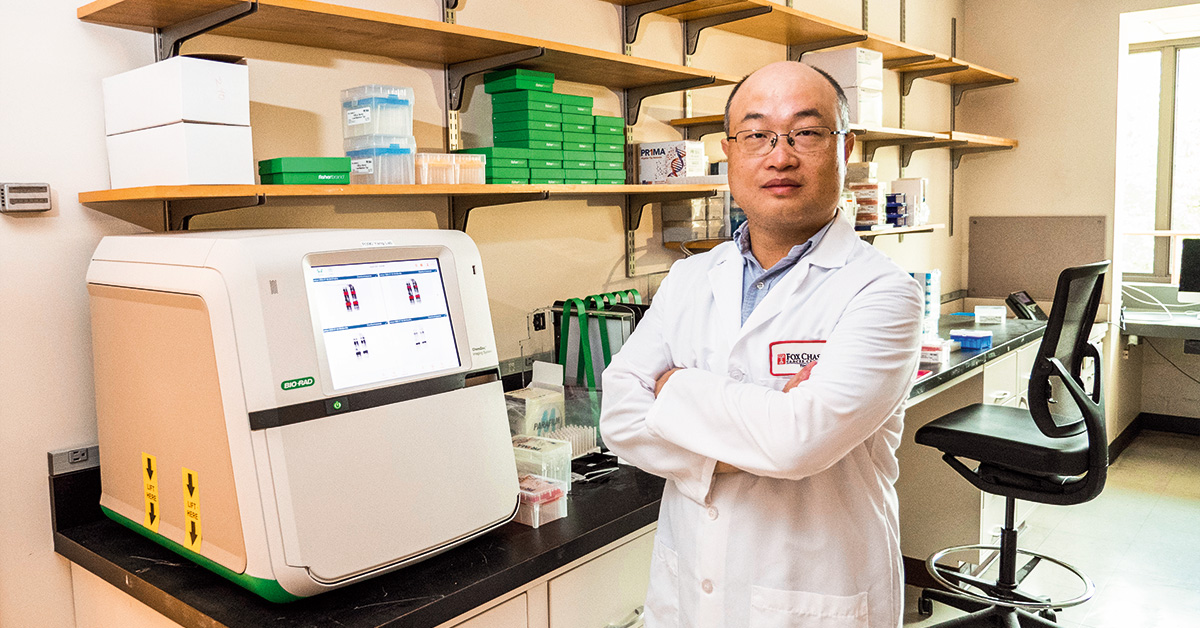Weather Alert: Following the winter storm, all Temple Health hospitals, campuses and clinical locations remain open. Patients will be contacted directly if their visit is affected. Please check TempleHealth.org or FoxChase.org for updates and monitor myTempleHealth for changes to scheduled appointments.
Breadcrumb
- Home
- Fox Chase Cancer Center News
- New Study From Fox Chase Cancer Center Researchers Identifies Key Immunological Pathway in ALCL Lymphoma
New Study From Fox Chase Cancer Center Researchers Identifies Key Immunological Pathway in ALCL Lymphoma

PHILADELPHIA (January 9, 2024) — A new study by Fox Chase Cancer Center scientists has found a key immunological pathway involved in anaplastic large cell lymphoma (ALCL), an important step toward developing new therapies. Researchers also identified a potential drug to target the pathway.
The study adds significantly to what scientists know about two subtypes of this rare and aggressive lymphoma, including ALK positive, which can be treated with chemotherapy, and ALK negative, which has few treatment options. Anaplastic large cell lymphoma is a fast-growing cancer that occurs in T-cells, an important type of cell in the immune system.
“We wanted to gain a comprehensive molecular understanding of the ALCL pathology so that we can try to find novel therapeutic approaches,” said Yibin Yang, PhD, an Associate Professor in the Cancer Signaling and Microenvironment Research Program at Fox Chase. “We ended up identifying an unexpected pathway.”
For the study, researchers at Fox Chase and other institutions conducted genome-wide CRISPR library screenings for both subtypes of ALCL. They found that an immunological pathway called IL-1R played a key role in supporting the survival of ALK-negative ALCL cancer cells. This pathway is typically involved with the inflammatory process, Yang said.
When researchers took a closer look, they found that the IL-1R pathway is activated by a cytokine called IL-1, which is essential for the induction and maintenance of inflammatory responses that assist in the growth of tumors in ALCL cells and primary cases of ALCL lymphoma.
Yang said the finding was initially a surprise since, as a critical mediator of immunity and inflammation, the IL-1R signaling pathway has been shown to play an essential role in many solid tumors in response to increased IL-1 in the tumor microenvironment — the cells, molecules, and other structures surrounding the tumor.
In solid tumors, chronic inflammation could increase the tendency to develop tumors related to IL-1. However, such an inflammatory environment is usually rare in lymphoma, and its role in lymphoid malignancies has not been evaluated. But Yang said that after further consideration, the results made sense because primary cutaneous ALCL, which primarily affects the skin, exhibits the highest IL-1 production in primary cases. This observation raises the possible link between inflammatory skin conditions and the development of ALCL.
In a follow-up study, researchers found that pacritinib, an existing targeted therapy drug also known by its brand name Vonjo, was effective against ALK-negative ALCL in vitro and in a mouse model, supporting clinical evaluation for its use against ALCL. The result is exciting, Yang said, because the drug, which is a JAK2/IRAK1 dual inhibitor, is already approved by the Food and Drug Administration for a bone marrow disorder, which means it could be moved to clinical trials for ALCL more quickly.
Along with the findings about ALCL, the team’s discovery about the mechanism of the IL-1R pathway could be a crucial tool in developing combination therapies to prevent cytokine storms, a life-threatening hyperactivation of the inflammatory response that can be a side effect of some T-cell immunotherapies.
Yang’s research team is now working on follow-up studies looking at how the IL-1R pathway influences the cellular microenvironment to promote cancer growth. “We’re trying to understand how this innate immune signaling plays a role in immunotherapies.”
The research was supported by NIH R01 CA259188, R01 CA251674, a Scholar Award from the Leukemia & Lymphoma Society, and a grant from Gabrielle’s Angel Foundation and The Mark Foundation.
The study, “Analysis and Therapeutic Targeting of the IL-1R Pathway in Anaplastic Large Cell Lymphoma,” was published in Blood.
Fox Chase Cancer Center (Fox Chase), which includes the Institute for Cancer Research and the American Oncologic Hospital and is a part of Temple Health, is one of the leading comprehensive cancer centers in the United States. Founded in 1904 in Philadelphia as one of the nation’s first cancer hospitals, Fox Chase was also among the first institutions to be designated a National Cancer Institute Comprehensive Cancer Center in 1974. Fox Chase is also one of just 10 members of the Alliance of Dedicated Cancer Centers. Fox Chase researchers have won the highest awards in their fields, including two Nobel Prizes. Fox Chase physicians are also routinely recognized in national rankings, and the Center’s nursing program has received the Magnet recognition for excellence six consecutive times. Today, Fox Chase conducts a broad array of nationally competitive basic, translational, and clinical research, with special programs in cancer prevention, detection, survivorship, and community outreach. It is the policy of Fox Chase Cancer Center that there shall be no exclusion from, or participation in, and no one denied the benefits of, the delivery of quality medical care on the basis of race, ethnicity, religion, sexual orientation, gender, gender identity/expression, disability, age, ancestry, color, national origin, physical ability, level of education, or source of payment.
For more information, call 888-369-2427